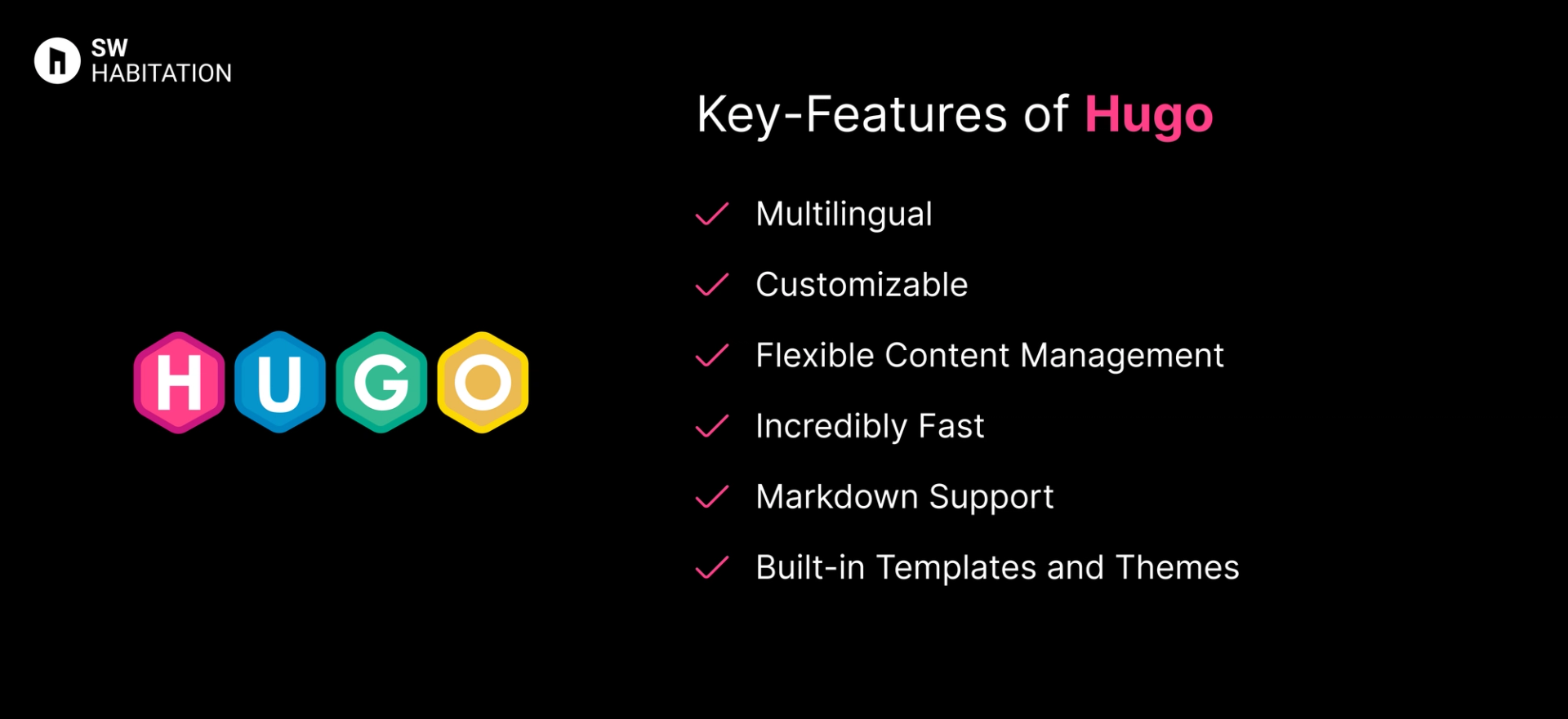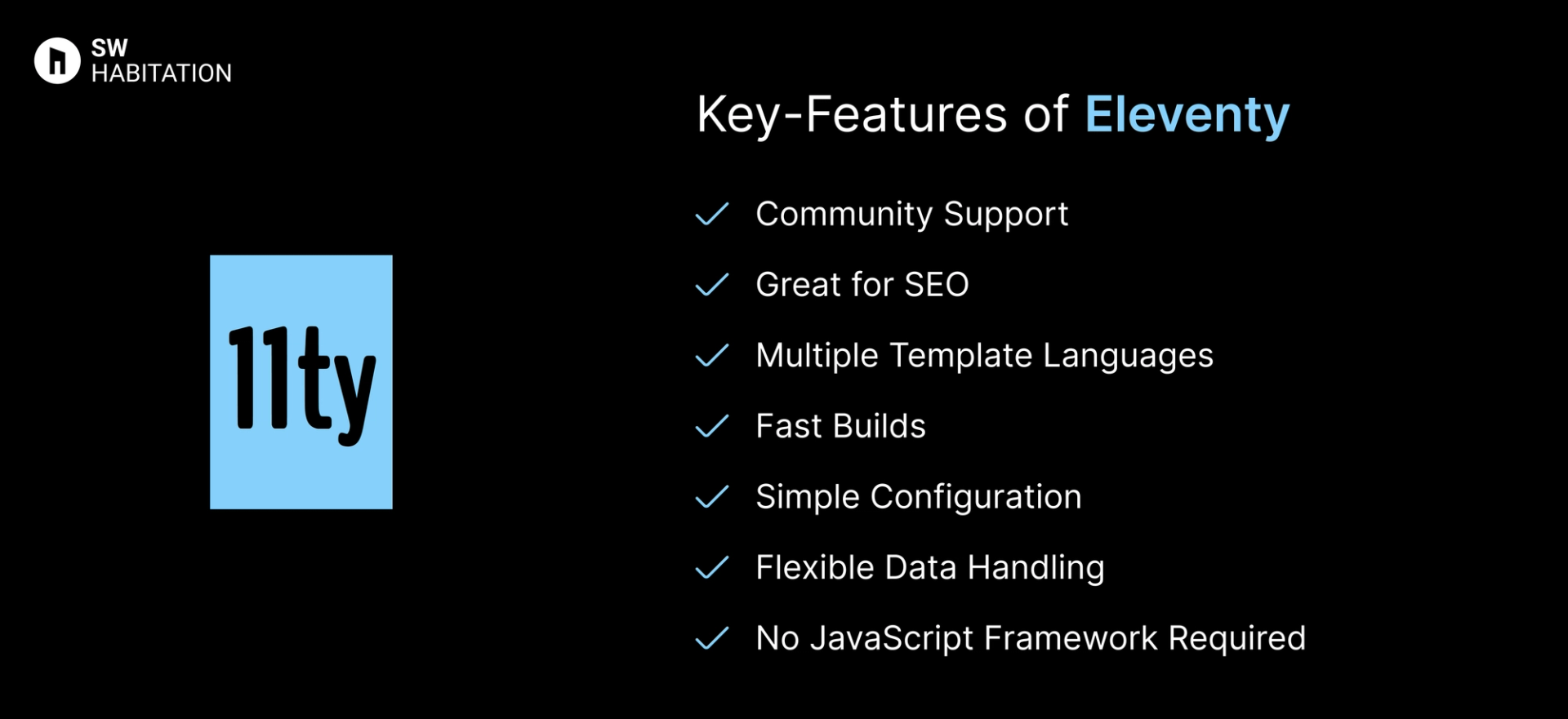Hugo vs. Eleventy

Hugo

Eleventy
Have you ever been to a website that loads super fast? Chances are it uses an SSG (Static Site Generator). It’s a tool that builds your site ahead of time, so when someone visits, they get the page instantly. No waiting around for things to load it’s just there.
What is Hugo?
Hugo is an open-source static site generator written in Go. It’s famous for its speed, being one of the fastest generators available, even with large websites.
Hugo uses Markdown files for content and allows you to customize your site with themes and templates. It’s simple, powerful, and perfect for those who want quick deployment with minimal setup.
Key Features of Hugo


- Multilingual: Easy setup for multi-language websites.
- Customizable: Plenty of configuration options to meet your needs.
- Flexible Content Management: Supports pages, posts, and taxonomies like tags and categories.
- Incredibly Fast: Hugo can generate thousands of pages in just a second.
- Markdown Support: Write in Markdown and Hugo will handle the rest.
- Built-in Templates and Themes: Use or create custom themes for fast and efficient development.
Advantages of Hugo
- Huge Community: With tons of themes, plugins, and community resources.
- Lightweight: Minimal dependencies required, which means less complexity.
- Full Flexibility: Create custom templates or use pre-built themes.
- Multilingual Sites: It’s a breeze to create websites in multiple languages.
- Super Speed: Hugo is one of the fastest static site generators available.
Disadvantages of Hugo
- Limited Plugins: While it has a good set, Hugo’s plugin ecosystem is not as huge as others like Gatsby.
- Requires Go Installation: You’ll need Go installed on your system, which could be a barrier for some users.
- Learning Curve for New Users: It can be challenging for beginners who aren’t familiar with the command line.
What is Eleventy ?
Eleventy is a static site generator that takes your content whether it’s Markdown, HTML, or other template languages and compiles it into static HTML files.
Unlike some other SSGs, Eleventy doesn’t lock you into a specific front-end framework, giving you the freedom to structure your project however you like. It’s designed to be simple, flexible, and fast, making it a favorite among web developers who appreciate minimalism.
Key Features of Eleventy


- Community Support: Growing community with tons of plugins and resources.
- Great for SEO: Generates static HTML, making your site search engine-friendly.
- Multiple Template Languages: Supports Markdown, Nunjucks, Liquid, Pug, and more.
- Fast Builds: Optimized for performance with lightning-fast build times.
- Simple Configuration: No complex setup — just a simple .eleventy.js config file.
- Flexible Data Handling: Use front matter, JSON, or JavaScript to handle data.
- No JavaScript Framework Required: Works with plain HTML and CSS if you prefer.
Advantages of Eleventy
- Lightweight: No heavy dependencies or boilerplate code.
- Fast and SEO-Friendly: Static HTML means quick load times and great SEO.
- Simplicity: No need to overthink just build.
- Ideal for Content-Driven Sites: Perfect for blogs, portfolios, and documentation.
- Flexible Content: Use different templating languages in one project.
Disadvantages of Eleventy
- Limited Out-of-the-Box Features: Requires plugins for things like image optimisation or RSS feeds.
- Minimal Abstractions: No built-in state management — you handle everything yourself.
- Learning Curve: Understanding its flexibility takes a bit of time.
Comparison Between Hugo vs Eleventy
Use Cases of Hugo
- Fast Build Times: If you have a lot of pages, Hugo generates them at an incredibly fast rate.
- Static Websites: Ideal for creating portfolios, documentation, and landing pages.
- High-Performance Blogs: Perfect for personal and developer blogs with a lot of content.
- Multi-Language Websites: Easy to create and maintain multilingual sites.
Use Cases of Eleventy
- Personal Blogs and Portfolios: Simple content-focused sites.
- SEO-Friendly Sites: Static HTML means better indexing by search engines.
- Documentation Sites: Great for organising and presenting technical documentation.
- Minimalist Projects: Ideal when you want full control with minimal abstraction.
Other Resources
Conclusion
Static Site Generators are a big game changer if you’re looking to build a website that’s fast, secure, and easy to maintain. Whether you’re launching a personal blog, portfolio, or a business website, they give you the freedom to focus on what really matters, your content and your users without all the extra complexity.
The best part? You’re not locked into one way of doing things. You can choose the tools and tech you’re most comfortable with, and scale things up as your site grows. From lightning-fast load times to better SEO and easy hosting, SSGs make the whole process smoother.
At the end of the day, it comes down to what fits your workflow and goals best. Pick the one that feels right to your requirements, and you’ll be well on your way to creating a beautiful, high-performing website that you’re proud of 🙌
Frequently asked questions
Is Hugo good for large websites?
Hugo is particularly well-suited for large-scale websites with many pages, such as documentation sites, portfolios, and blogs.
Can I customize Hugo themes?
Yes, Hugo comes with a large selection of themes, and they are highly customizable. You can modify them or create your own theme from scratch.
Does Hugo support multiple content types?
Yes, Hugo is highly flexible and supports multiple content types, including Markdown, JSON, YAML, and HTML, making it suitable for all kinds of content-driven websites.
What makes Hugo so fast?
Hugo is incredibly fast because it’s written in Go, a highly performant programming language. It can build websites in seconds, even if they have thousands of pages.
Is Eleventy fast?
Yes very fast, Eleventy is known for its quick build times and low overhead, making it perfect for fast static websites.
Does Eleventy have built-in data handling?
Yes, Eleventy handles data from JSON, YAML, Markdown, and more, which can be injected directly into your templates.
Is Eleventy SEO-friendly?
Yes, Eleventy outputs clean HTML with customizable metadata, so you can fine-tune your SEO strategy easily.
Does Eleventy support multiple templates?
Yes, Eleventy is template agnostic means you can use Nunjucks, Liquid, Markdown, Pug, and more.
